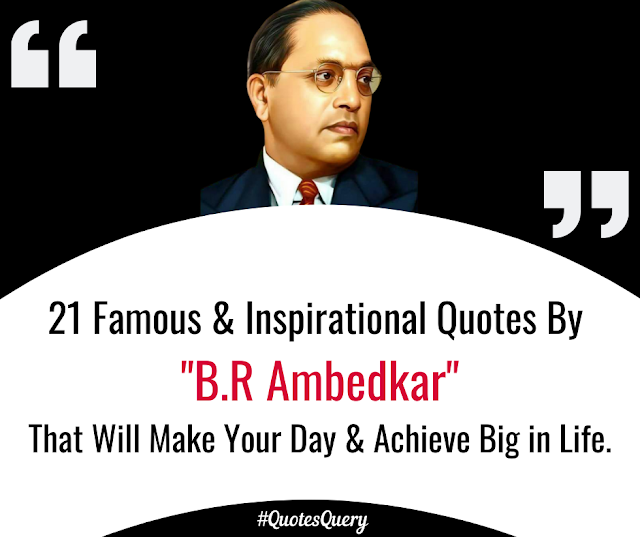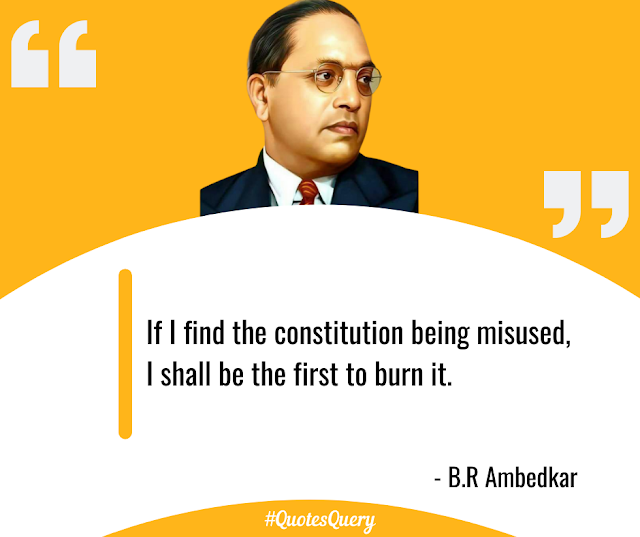Dr. Bhimrao Ramji Ambedkar (14 April 1891 - 6 December 1956), also known as Basahebheb Ambedkar was an Indian polymath - a philosopher, jurist, economist, politician, social reformer, journalist, writer, sociologist and scholar of nature. He promoted the Dalit Buddhist movement and campaigned against racism in the non-Dalits.
He was the British Labour Minister at Viceroy's Executive
Council, the Chairman of the Constituent Drafting Committee, the Indian
Independent Minister of Justice, and considered to be the chief architect of
the Indian Constitution.
Ambedkar was an active student, earning a doctorate in economics from Columbia University and the London School of Economics, earning a reputation as an expert in his research in law, economics and political science. In his early career, he was an economist, professor, and lawyer.
His later life was marked
by his political activities; participated in India's campaigns and
negotiations, published magazines, promoted the political and social rights of
the Dalits and made a significant contribution to the founding of India.

Ambedkar was born on April 14, 1891, in the town and at the corner of the Mow (now officially known as Dr Ambedkar Nagar) in the central provinces (now Madhya Pradesh). He was the 14th and last child of Ramji Maloji Sakpal, the military commander in charge of Subedar, and Bhimabai Sakpal, the daughter of Laxman Murbadkar.
His family belonged to the Marathi area from the town of Ambadawe (Mandangad taluka) in Ratnagiri district in the present-day Maharashtra region. Ambedkar was born in the Mahar (Dalit) sect, who were treated as untouchables and socially and economically discriminated against. Ambedkar's ancestors had served in the British East India Company for a long time, and his father had served in the British Indian Army in the Show of State. Although attending school, Ambedkar and other unaffected children were isolated and ignored or assisted by teachers. They were not allowed to stay inside the classroom.
When they needed to drink water, someone from the upper
classes had to pour the water out of the water because they were not allowed to
touch the water or the boat in it. This job was usually done for young Ambedkar
by a school investigator, and if the pension was not available, he had to go
without water; he described the situation later in his writings as "No
peon, No Water".
Drafting of the Constitution of India
When India became independent on August 15,
1947, a new Congress-led government invited Ambedkar to serve as the country's
first Minister of Justice, and he accepted. On August 29, he was elected Chairman
of the Constitutional Planning Committee, and was appointed by Parliament to
draft a new Constitution for India.
Granville Austin described the Indian
Constitution was written by Ambedkar as 'the first and most important document'.
"The great provision of the Indian constitution has come directly to
further the cause of social change or to try to promote this change by creating
the conditions necessary for it to be achieved."
The document prepared by Ambedkar provided guarantees and constitutional protections for the various forms of civil liberties for each citizen, including religious freedom, the abolition of intellectual property, and the prohibition of all forms of discrimination. Ambedkar challenged the great economic and social rights of women and won the support of Parliament to introduce a system of job placement in public services, schools and colleges for members of organized and international organizations and the Other Backward Class, a process that goes hand in hand with consent.
Indian legislators hoped to end social and economic inequality
and the lack of opportunities for India's oppressed sections through these
measures. The Constitution was adopted on 26 November 1949 by the Electoral
Commission.
Conversion to Buddhism
Ambedkar considered converting to Sikhism,
which encouraged opposition and therefore appealed to the leaders of organized
groups. But after meeting with Sikh leaders, he concluded that he might get a
second Sikh status.
Instead, about 1950, he turned his attention to
Buddhism and travelled to Ceylon (now Sri Lanka) to attend the World Fellowship
of the Buddhist religion. While handing over a new Buddhist vihara near Pune,
Ambedkar announced that he was writing a book on Buddhism and that once
completed, he would officially convert to Buddhism.
Let's take a look at the amazing quotes deliverd by B.R Ambedkar:
1. It is not enough to be electors only. It is necessary to be law-makers; otherwise those who can be law-makers will be the masters of those who can only be electors.






















